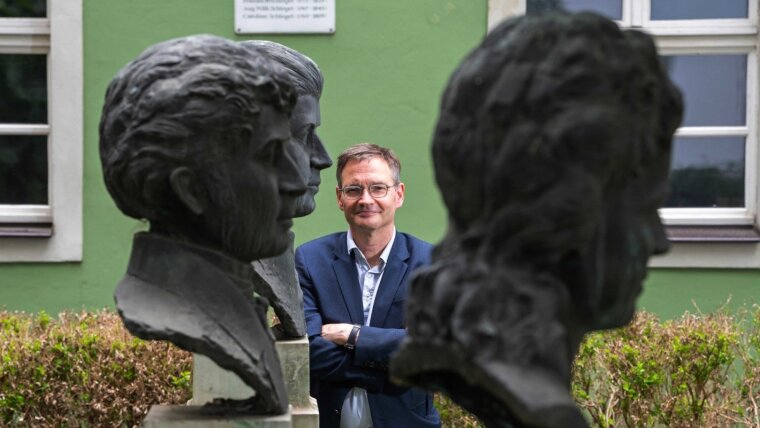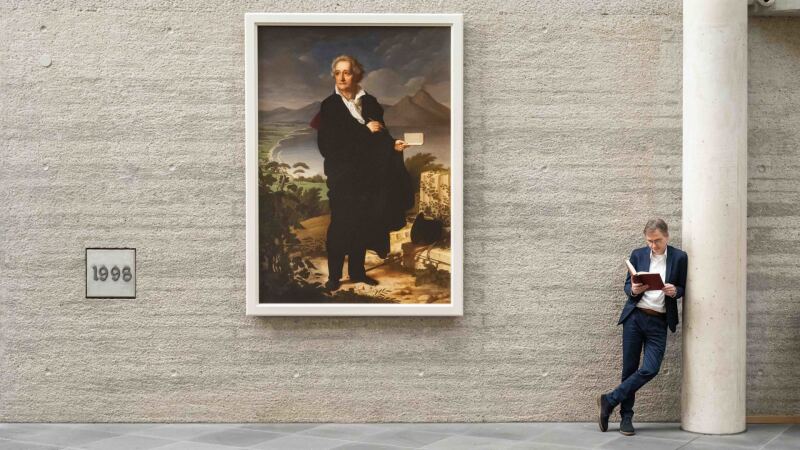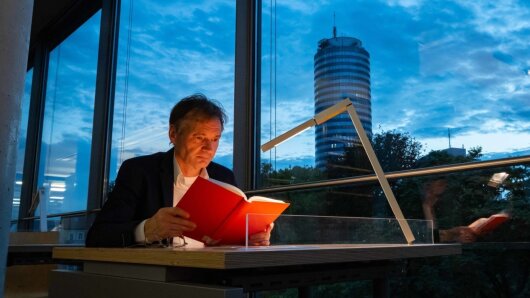
Literary scholar Prof. Stefan Matuschek heads the Research Training Group ›Romanticism as a Model. Variation–Scope–Relevance‹. In the interview, he explains how Romanticism can save us from fundamentalism today, why Goethe and Schiller are not »classical authors« but »Romantics« and why Romanticism in Germany would have undergone a completely different development without the University of Jena.
Interview by Ute Schönfelder
What is the essence of Romanticism for you?
This is made clear above all in the relationship of Romanticism to the Enlightenment. A still popular idea is that Romanticism is a kind of counter-movement after the scientific, conceptual Enlightenment, a kind of re-enchantment of the world. In a negative sense, it is then often seen as involving irrationalism or even, as Georg Lukács once said, the destruction of reason. I think that is quite wrong. Romanticism is a very valuable legacy for us! It offers us a modus for dealing with things that we cannot process at the level of our clear concepts and clear reason: is there a perspective beyond individual, physical death? Does life have a meaning? We cannot find empirical answers to such questions, but they have very great significance for human life. That is why we seek answers. And we find answers through our imagination.
That is to say, we just make up the answers ourselves?
That is to say that we imagine things. We can imagine a life after death. We can imagine the world and our lives as a whole. However, that alone does not constitute the legacy of Romanticism. The legacy of Romanticism is its ability to show us the difference between what we can measure and what we can only imagine.
Romanticism in literature developed procedures that indicate this boundary between what I can know precisely and what goes beyond that by means of the imagination. In its literature, it celebrates human life and the human perception of the world as one that always has an imaginary surplus. And the great thing about Romantic literature is that it was the first to mark such a thing stylistically, with elements of irony, of subjectivation.
I like to explain this with the metaphor of two-in-one optical illusion pictures, in which you see first one figure and then the other. Romanticism develops such two-in-one figures out of literary stylistics, with conceptions of wholeness and transcendence, and the hint that they are only imaginary concepts. One takes this seriously while knowing, nevertheless, that it is only an imaginary concept. Romantic literature is the first to have achieved something like this stylistically.
Do you have an example of this?
A very vivid example is the poem »Moonlit Night« by Joseph von Eichendorff. The third verse reads: »Meine Seele spannte weit ihre Flügel aus, flog durch die stillen Lande als flöge sie nach Haus« (»And my whole soul outspreading her wings abroad to roam, flew thro’ the sleeping land, as if flying home«). It’s all in the subjunctive »flöge« in the last line! Everything is imagination. The author conveys a pleasurable experience of nature and a comfort beyond earthly life. He puts it in this simple yet easily imagined metaphor. I can literally see the soul before me as a little bird. The fact that it flies »home« is also an imaginary concept. It can be a Christian confession, but it doesn’t have to be. And that’s wonderful! The poem conveys this concept and at the same time the awareness that it is only an imaginary concept.
What do you think is valuable about it beyond the study of literature?
This literature is an expression of modern transcendence. This innovation of Romanticism is a consequence of the Enlightenment. The Romantics think and formulate on the basis of the Enlightenment. They were all enlightened people. But they knew about the impact of imagination on human life. After the innovations of the Enlightenment, we have in Romanticism the second impetus to innovation that helped to set modernity on its course just as much as the Enlightenment itself. The question of how to deal with something about which we have no certain knowledge is still highly relevant today. Because we don’t simply remain silent about these questions, but form imaginary concepts. And we can make ourselves aware that they are only imaginary concepts. If we understand Romanticism in this way, it is the most effective means against any form of fundamentalism.
Myths played an important role in the Romantic era. Do you see parallels in the present, as, after all, myths spread faster than ever today, for example in social media?
Yes, there are definitely parallels. Above all, we can see what happens if we don’t accept the legacy of Romanticism! The essential thing about the Romantic new mythology was the awareness that a new mythology was being created—not a new science. The Romantics wanted to create new narratives that were at the cutting edge of contemporary knowledge and yet could be understood by all. The problem we have with modern internet myths is that many people do not reflect on them as myths. I think it is important in this context not to use the term conspiracy theory, but to speak of conspiracy myths instead. We have to realize that these are myths, not »theories« that provide possible explanations of reality. If we succeed in doing this, we will have understood the legacy of Romanticism. Because then we will be aware of the imaginary as such. Then we will be reflective Romantics.
Goethe and Schiller, the representatives of ›Weimar Classicism‹, are considered Romantics in other European countries. Why is that?
That is a great misunderstanding. There is no such thing as an era of »Classicism«. »Classicism« is not an era, but instead the term »classic« describes in literature that which is considered exemplary.
In European literature, each example of a classic belongs to a completely different era. Italian classics are from the late Middle Ages and early Renaissance. English classics are a »one-man show« called Shakespeare and date back to the Elizabethan Baroque. French classics are also Baroque, associated with the court theatre of Louis XIV in the late 17th century. And German classics just happen to appear in the transitional period between the Enlightenment and Romanticism. And when we speak of the »classics«, we mean the writers who took part in these two eras that have shaped modernity.
So that means Goethe and Schiller, among others?
Exactly. Goethe and Schiller are Enlightenment writers and Goethe and Schiller are also Romantics. And that is not a contradiction! On the one hand, they do not leave behind their Enlightenment origins, but remain Enlightenment thinkers to the end. At the same time, they are very innovatively involved in the developments of Romanticism. The first part of Goethe’s »Faust« is the masterpiece of European Romanticism!
Goethe and Schiller also had a close relationship with Jena. Why did Jena become the centre of the early Romantic movement in Germany?
The University is a very substantial part of the history of the founding of Romanticism. If Jena hadn’t had a university, it wouldn’t have happened here. And it wouldn’t have happened either if the University of Jena hadn’t been so poor around 1800.
Why not?
The university appointed young people who were not yet established in their careers, because they were simply cheaper. And the good fortune was that these people achieved so much and that they were so productive, especially in their early years. The key person for the beginning of Romanticism is August Wilhelm Schlegel. He came to the University of Jena in 1796, and was followed by other important figures, such as his brother Friedrich and Friedrich Schelling in 1798. The fact that Jena was a small town at the time and that academic culture could therefore be so dominant also played a role. The early Romantics believed they were at the summit of society. That would not have been possible in a big city. Basically, then, one has to postulate that it was not Jena as a city that was the birthplace of Romanticism, but the University of Jena. It’s something special for a university to write cultural history in such a way!
Is the Romantic movement, especially Jena’s early Romanticism, a generational movement?
Yes. Conflicts increasingly arose between the established generation of writers of the Enlightenment and the young generation of the emerging early Romantic movement. But the conflicts were not so much about content. What separated the young people from the established Enlightenment writers was their attitude to what is termed »common sense«. And that resulted from the influence of Kantian philosophy as represented by the Romantics.
In what way?
At the time, Kant’s philosophy had a greater impact in Jena than in any other place. Kant may have given his lectures in Königsberg, but he caused far more of a stir with them in Jena than he did there. And Kant’s philosophy suggests that common sense alone is not enough, but that there is a breach in the attitude to reality, between scientific knowledge and human self-reflection. Kant made a distinction, for example, between the concepts of »understanding« and »reason«: understanding uses secure knowledge obtained from empirical facts and reason uses the ideas that go beyond that. This distinction did away with the idea that one could use common sense to answer everything coherently. The young Romantics took this on board and considered the established Enlightenment thinkers to be out of step with the times. Therefore, the early Romantics are not breaking with the Enlightenment, but with the confidence in common sense.
In your opinion, what is the importance of research on Romanticism today and what questions are still open?
It’s still very important. For some decades now, it has formed a very broad track in literary studies. What is new is that Romanticism is currently being placed in European contexts. National literatures are not appropriate boundaries. This also leads to a current open question in Romanticism research: is there a unity of Romanticism or is it made up of areas that differ too much? We are looking into this question in our Research Training Group. In this research, we are using the concept of the »model«. Therefore—to anticipate things somewhat—there is not one Romanticism and neither is there an infinite number of Romanticisms, but instead, certain models have emerged. That is what we’re working on in the various interdisciplinary projects.
What fascinates you personally about this era?
I’m fascinated to see what an impact literary forms can have on life. That such research is not just a niche philological occupation, but that Romanticism can provide a better understanding of human reality.
Do you have a favourite Romantic?
No. I’ve studied too many of them for too long and too intensively for that.
And how about a reading tip for laypeople to help them gain an understanding of Romanticism?
I would recommend E.T.A Hoffmann’s »The Sandman« or »The Golden Pot«. Hoffmann wrote in a very innovative and masterly fashion. He used the fantastic—incidentally also an invention of Romanticism—to depict problems of the human psyche and get to the heart of those problems like no one else had done before him. He can be considered the most important author in Germany around 1800! And he combines high-quality literature with entertainment. That would be a good introduction to Romanticism.
Romantics in the Thuringian State and University Library (ThULB): Johann Wolfgang Goethe (left) in a painting by Heinrich Christoph Kolbe (1771-1836) from 1822 and Stefan Matuschek reading.
Image: Jens Meyer (University of Jena)
